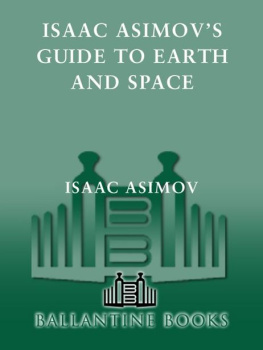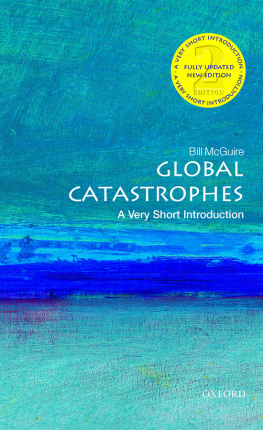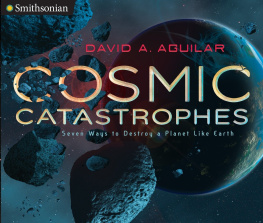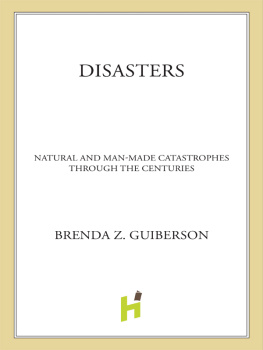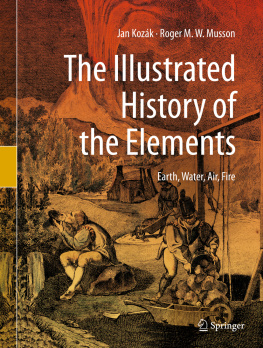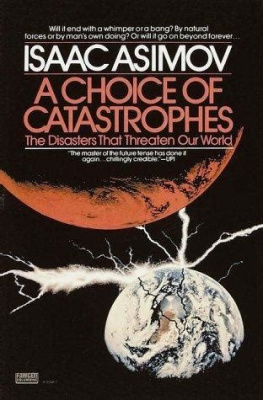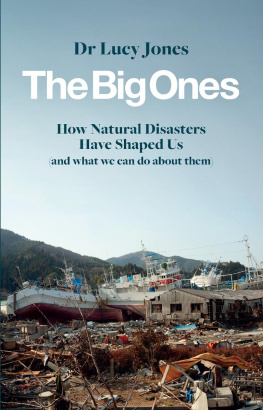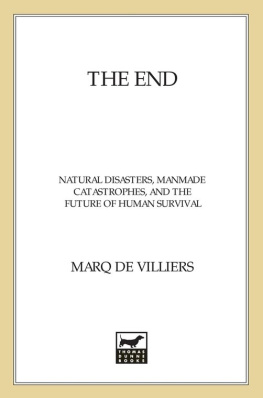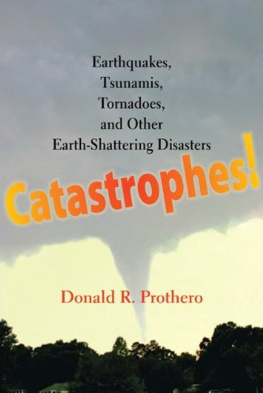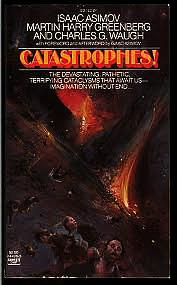CATASTROPHES!
edited by
Isaac Asimov,
Martin Harry Greenberg,
and Charles G. Waugh
Foreword and Notes by Isaac Asimov
FAWCETT CREST * NEW YORK
CATASTROPHES!
Published by Fawcett Crest Books, a unit of CBS Publica tions, the Consumer Publishing Division of CBS Inc.
Copyright 1981 Isaac Asimov, Martin Harry Greenberg and Charles G. Waugh.
All Rights Reserved
ISBN: 0-449-24425-3
Printed in the United States of America
First Fawcett Crest printing: July 1981
987654321
The editors and publisher are grateful for permission to re print the following:
"No Other Gods" by Edward Wellen. Copyright 1972 by Mercury Press, Inc. Reprinted from The Magazine of Fantasyand Science Fiction by permission of the author,
"The Wine Has Been Left Open Too Long and the Memory Has Gone Flat" by Harlan Ellison appeared in Universe 6 (edited by Terry Carr) and in the author's collection Strange'Wine. Copyright 1976 by Harlan Ellison, Reprinted by arrangement with and permission of the author and the au thor's agent, Robert P, Mills, Ltd., New York. All rights re served. Excerpts from "The Chart" by W.S. Merwin appear ing in "The Wine Has Been Left Open Too Long and the Memory Has Gone Flat," which originally appeared in The New Yorker, are reprinted by permission of Atheneum Pub lishers, from the book Houses and Travellers by W.S. Merwin. Copyright 1977 by W.S. Merwin. Used with thanks,
"Stars, Won't You Hide Me?" by Ben Bova. Copyright 1966, 1973 by Ben Bova. Reprinted by permission of the author.
"Judgement Day" by Lloyd Biggie, Jr. Copyright 1953 by King-Size Publications. Reprinted by permission of the author and his agent, Kirby McCauley.
"The Custodian" by William Tenn. Copyright & 1953 by the Quinn Publishing Company, Inc. Reprinted by permission of the author.
"Phoenix" by Clark Ashton Smith. Copyright 1954 by Au gust Derleth. Reprinted by permission of the agents for the author's estate, Scott Meredith Literary Agency, Inc., 845 Third Ave., New York, NY 10022,
"Run From the Fire" by Harry Harrison. Copyright 1975 by Robert Silverfaerg and Roger Elwood; reprinted with per mission of the author.
"Requiem" by Edmond Hamilton. Copyright 1962 by Ul timate Publishing Company. Reprinted by permission of the agents for the author's estate, Scott Meredith Literary Agency, Inc., 845 Third Ave., New York, NY 10022.
"At the Core" by Larry Niven. Copyright 1966 by the Galaxy Publishing Corporation. Reprinted by permission of Robert P. Mills, Ltd.
"A Pail of Air" by Fritz Leiber, Copyright 1951 by Galaxy Publishing Corporation. Reprinted by permission of Robert P. Mills, Ltd.
"King of the Hill" by Chad Oliver. Copyright 1972 by Harlan Ellison. First published in Again, Dangerous Visions, edited by Harlan Ellison. Copyright assigned to Chad Oliver 1979. Reprinted by permission of Chad Oliver.
"The New Atlantis" by Ursula K. Le Guin. Copyright 1975 by Ursula K. Le Guin; reprinted by permission of author and her agent, Virginia Kidd.
"History Lesson" by Arthur C. Clarke. Copyright 1949 by Arthur C. Clarke; copyright renewed. Reprinted by permis sion of the author and his agents, Scott Meredith Literary Agency, Inc., 845 Third Ave., New York, NY 10022.
"Seeds of Dusk" by Raymond Z. Gallun. Copyright 1938 by Street & Smith Publications; copyright renewed. Re printed by permission of Robert P. Mills, Ltd.
"Dark Benediction" by Walter M. Miller, Jr. Copyright 1951 by Walter M. Miller, Jr., renewed 1979. Reprinted by permission of the Harold Matson Co., Inc.
"Last Night of Summer" by Alfred Coppel. Copyright 1956
by A. Wyn, Inc. Reprinted by permission of The Lescher
Agency.
The Store of the Worlds" by Robert Sheckley. Copyright 1959 by Robert Sheckley. Reprinted by permission of Abby Sheckley.
"How It Was When the Past Went Away" by Robert Silver- berg. Copyright 1969 by Robert Silverberg. Reprinted by permission of the author and his agents, Scott Meredith Lit erary Agency, Inc., 845 Third Ave., New York, NY 10022.
"Shark Ship" by C. M. Kornbluth. Copyright 1958 by C. M. Kornbluth. Reprinted by permission of Robert P. Mills, Ltd.
Foreword
Part I - Universe Destroyed
The Last Trump Isaac Asimov
No Other Gods Edward Wellen27
The Wine Has Been Left Open
Too Long and the Memory
Has Gone Flat Harlan Ellison33 Stars, Won't You Hide Me?
Ben Bova
Part II - Sun Destroyed
Judgement Day Lloyd Biggie, Jr.
The Custodian William Tenn
Phoenix Clark Ashton Smith
Run from the Fire Harry Harrison
Part III - Earth Destroyed
Requiem Edmond Hamilton
At the Core Larry Niven
A Pail of Air Fritz Leiber
King of the Hill Chad Oliver
Part IV - Humanity Destroyed
The New Atlantis Ursula K. Le Guin194
History Lesson Arthur C. Clarke 217
Seeds of the Dusk
Raymond Z, Gallun 226
Dark Benediction
Walter M. Miller, Jr.
Part V - Civilization Destroyed
Last Night of Summer
Alfred Coppel
The Store of the Worlds
Robert Sheckley 316
How It Was When the Past
Went Away Robert Silverberg
Shark Ship C. M. Kornbluth
Afterword
Foreword
It is quite customary for a piece of fiction to contain at least the threat of disaster. It is the threat, the menace, the ap prehension of something one desperately does not want to take place that creates the suspense, and that rouses the interest of the reader.
To be sure, the disaster may be a very slight and personal one-the youngster who may fail the test, or lose the game, or be turned down for a date-but it is there. To be equally sure, the story may be a lighthearted one with a happy end ing, but the disaster, however slight, must be there in the mid-course for the ending to shine happily against.
This is not to say that a story cannot be written without a disaster, but what a dull story it would be and how little worth the reading.
And, as in so many other respects, science fiction manages
to outshine other types of fiction. Where but in science fiction can real disasters be found?
Take the most elaborate of realistic suspense and what can you have? The loss of a war? The enslavement of a nation?
In science fiction, the destruction of civilization is the least one might expect as the threat of disaster, or its actual ac complishment, is represented to the reader.
In this collection of twenty stories, we have four stories dealing with each of five different levels of disaster, organized according to a scheme I devised in my nonfiction discussion entitled A Choice of Catastrophes (Simon and Schuster, 1979; Fawcett Columbine, 1981),
The movement is from the most all-encompassing catas trophes toward progressively narrower ones. If this sounds to you like a journey into anticlimax, you are wrong, for as the catastrophes become narrower, they also become more probable. In short, in this book you may be steadily decreas ing the scope but you are as steadily increasing the danger.
Why bother? Why scare yourself?
For one thing, these are memorable stories you will enjoy and won't easily forget. For another, humanity does face catastrophes of various levels of scope and various gradations of likelihood, and if there is any chance at all of evading them or blunting them, that chance will be heightened if we know what the dangers may be and consider in advance how to prevent or ameliorate them.
Staring at danger may not be pleasant-but closing your
Next page

